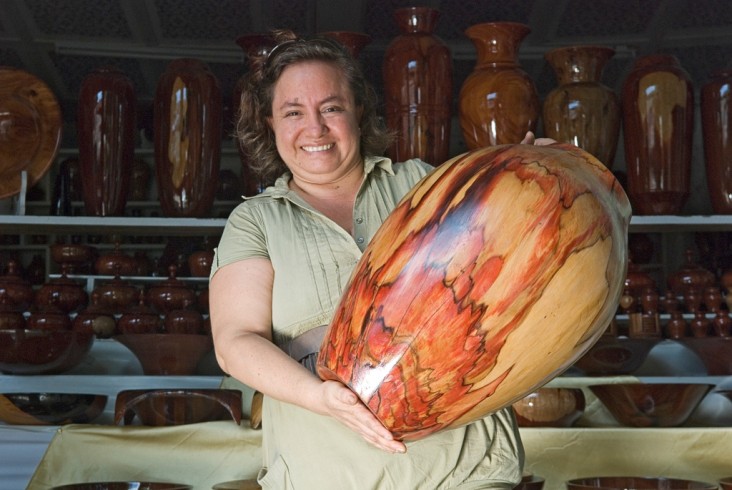
Llamely Tejedo will never forget the day she told her brother that she wanted to open her own business.
“He looked at me and said, ‘If you choose to be poor, I feel sorry for you,'” she recounts with a steady gaze.
But Tejedo, who has degrees in accounting and foreign trade, forged onward and opened a business in 2007 selling artisanal handicrafts that she and another brother made from precious Amazonian woods and a special resin she discovered while studying in Brazil.
“At the beginning, it was tough, and we would stay up late working into the night. Little by little, however, we closed on a few orders,” she says.
Today, in 2013, Tejedo’s company, Tejedo Arts, sells over 800 handicraft pieces a month in Peru, and exports another 400 to the United States and Europe.
With support from USAID’s Peru Bosques Project, Tejedo gained visibility at the ExpoAmazónica and Hecho a Mano trade fairs where Amazonian entrepreneurs showcased and sold their goods, and had a chance to expand their client base. During the fairs, she made contact with buyers that will allow her to export handicrafts directly. With these deals in the pipeline, she is now evaluating how to increase production to satisfy larger orders from inside and outside Peru.
In October 2012, Peru Bosques invited Tejedo to participate in Social Inclusion Week, an international initiative sponsored by the Peruvian Ministry for Development and Social Inclusion to promote women as drivers of economic growth. She spent the week with a select group of women entrepreneurs chosen for their business accomplishments and community leadership. During the week, they spoke about the trials and rewards of being women entrepreneurs from the Amazon, and had the opportunity to meet U.S. Secretary of State Hillary Clinton when she visited the USAID display.
The experience inspired Tejedo to take her work in a new direction.
"I want to create a worker’s association in my own district, inspire women where I live, and work more closely with indigenous communities so that someday they will make handicrafts and see greater returns," says Tejedo. “I never knew that women could be so brave. It’s one thing to run a business, but quite another to motivate people to be part of a world in which they are empowered. I left the conference proud of what I do, and with my goals in mind.”
Putting ideas into practice, Tejedo Arts has initiated a partnership to purchase wood from three indigenous groups that have plans for responsible harvesting of forest products. Peru Bosques helped Tejedo to conduct a market study to maximize sales and returns through product development and a targeted marketing approach.
“There are steps to reaching my dreams, and this market study is a first step. I’m on my way, but I will not stop there,” she says.
With the project's support, Tejedo has also developed a Web page with an online catalogue, increasing visibility for her products.
“I have good ideas, but I need to be encouraged, and with USAID’s support to become an advocate for women entrepreneurs, I will do it,” she affirms.
The Peru Bosques Project, which runs from July 2011 to July 2016, is designed to achieve: a legal and regulatory framework to protect Peru’s forest sector, a sustainable conservation of biodiversity in the country’s Amazonian forests, and increased economic opportunities for businesses and native communities that make products from the forests' natural resources.







Comment
Make a general inquiry or suggest an improvement.